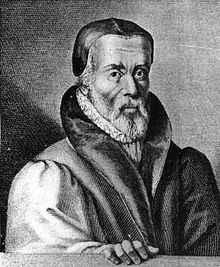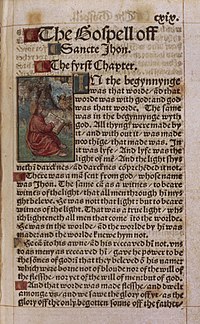Traveling within the World
Linking your favorite traveling artists across the globe
William Tyndale
Charged with Heresy and Burned atthe stake for changing the bible from Hebrew to English

| Born | fl. 1484–1496 Gloucestershire, England |
|---|---|
| Died | c. 6 October 1536 near Vilvoorde, Duchy of Brabant,Seventeen Provinces |
| Cause of death | Executed by strangling, then burnt at the stake |
| Alma mater | Magdalen Hall, University of Oxford |
| Known for |
|
William Tyndale (sometimes spelled Tynsdale, Tindall, Tindill, Tyndall; c. 1494–1536) was an English scholar who became a leading figure in Protestant reform in the years leading up to his execution. He is well known for his translation of the Bible into English. He was influenced by the work of Desiderius Erasmus, who made the Greek New Testament available in Europe, and by Martin Luther.[1]While a number of partial and incomplete translations had been made from the seventh century onward, the grass-roots spread ofWycliffe's Bible resulted in a death sentence for any unlicensed possession of Scripture in English—even though translations in all other major European languages had been accomplished and made available Tyndale's translation was the first English Bible to draw directly from Hebrew and Greek texts, the first English one to take advantage of the printing press, and first of the new English Bibles of the Reformation. It was taken to be a direct challenge to the hegemony of both the Roman Catholic Church and English Laws to maintain church rulings. In 1530, Tyndale also wrote The Practyse of Prelates, opposing Henry VIII's divorce on the grounds that it contravened Scripture.
Tyndale had to learn Hebrew in Germany due to England's active Edict of Expulsion against the Jews. He worked in an age where Greek was available to the European scholarly community for the first time in centuries. Erasmus compiled and edited Greek Scriptures into the Textus Receptus — ironically, to improve upon the Latin Vulgate—following the Renaissance-fueling Fall of Constantinople in 1453 and the dispersion of Greek-speaking intellectuals and texts into a Europe which previously had access to none. Sharing Erasmus' translation ideals, Tyndale took the ill-regarded, unpopular and awkward Middle-English "vulgar" tongue, improved upon it using Greek and Hebrew syntaxes and idioms, and formed an Early Modern English basis that Shakespeare and others would later follow and build upon as Tyndale-inspired vernacular forms took over. When a copy of The Obedience of a Christian Man fell into the hands of Henry VIII, the king found the rationale to break the Church in England from the Roman Catholic Church in 1534.
In 1535, Tyndale was arrested and jailed in the castle of Vilvoorde (Filford) outside Brussels for over a year. In 1536 he was convicted of heresy and executed by strangulation, after which his body was burnt at the stake. His dying request that the King of England's eyes would be opened seemed to find its fulfillment just two years later with Henry's authorization of The Great Bible for the Church of England—which was largely Tyndale's own work. Hence, the Tyndale Bible, as it was known, continued to play a key role in spreadingReformation ideas across the English-speaking world and eventually, on the global British Empire. His version worked prominently into the Geneva Bible which was taken to the New World to Jamestown, Virginia in 1607, and on the Mayflower in 1620.
Notably, in 1611, the 54 independent scholars who created the King James Version, drew significantly from Tyndale, as well as translations that descended from his. One estimate suggests the New Testament in the King James Version is 83% Tyndale's, and the Old Testament 76%
Sculpted Head Of William Tyndale from St Dunstan-in-the-West Church London
Biography
Tyndale was born at some time in the period 1484–1496, in Melksham Court, Stinchcombe, a village near Dursley, Gloucestershire. The Tyndale family also went by the name Hychyns (Hitchins), and it was as William Hychyns that Tyndale was enrolled at Magdalen College School, Oxford. Tyndale's family had migrated to Gloucestershire at some point in the 15th century – probably as a result of the Wars of the Roses. The family derived from Northumberland via East Anglia. Tyndale's brother, Edward, was receiver to the lands of Lord Berkeley as attested to in a letter by Bishop Stokesly of London and included in a biography on William Tyndale by the Rev R Demaus published in 1871, at page 5. Tyndale is recorded in two genealogies[8] as having been the brother of Sir William Tyndale, of Deane, Northumberland, and Hockwald, Norfolk, who was knighted at the marriage of Arthur, Prince of Wales to Catherine of Aragon. Tyndale's family was thus derived from Baron Adam de Tyndale, a tenant-in-chief of Henry I (see Tyndall). William Tyndale's niece, Margaret Tyndale, was married to the Protestant martyr, Rowland Taylor, burnt during the Marian Persecutions.
Betrayal and death
William Tyndale, before being strangled and burned at the stake, cries out, "Lord, open the King of England's eyes".woodcut from Foxe's Book of Martyrs (1563).
Eventually, Tyndale was betrayed by Henry Phillips to the imperial authorities, seized in Antwerp in 1535 and held in the castle of Vilvoorde (Filford) near Brussels.He was tried on a charge of heresy in 1536 and condemned to be burned to death, despite Thomas Cromwell's intercession on his behalf. Tyndale "was strangled to death while tied at the stake, and then his dead body was burned".(The strangulation was not fully effective and Tyndale partially revived, it was reported that he was aware of being burned but died in a quiet, stoical manner). Reportedly, his final words, spoken "at the stake with a fervent zeal, and a loud voice", were reported as "Lord! Open the King of England's eyes." The traditional date of commemoration is 6 October, but records of Tyndale's imprisonment suggest the actual date of his execution might have been some weeks earlier. Foxe gives 6 October as the date of commemoration (left-hand date column), but gives no date of death (right-hand date column).
Within four years, at the same king's behest, four English translations of the Bible were published in England,including Henry's officialGreat Bible. All were based on Tyndale's work. Although Tyndale's translation of the Old Testament remained unfinished at his death, his work formed the basis of all subsequent English translations of the Bible, including the 'King James' version of 1611.
Memorial to William Tyndale in a Vilvoorde public garden
Tags:
Replies to This Discussion
Events
-
2014 is the Chinese Year of the Horse
February 17, 2026 at 12am to February 5, 2027 at 12am – where & how you choose
Birthdays
Birthdays Today
Important (read & understand)
Skype: Travelingraggyman
Email and Instant Messenger:
TravelerinBDFSM @ aol/aim; hotmail; identi.ca; live & yahoo
OR
Travelingraggyman @ gmail and icq ***

1AWARD UPDATES & INFORMATION
10,000 votes - Platinum Award
5,000 votes - Gold Award
2,500 votes - Silver Award
1,000 votes - Bronze Award
300 votes - Pewter Award
100 votes - Copper Award
Member of the Associated Posting System {APS}
This allows members on various sites to share information between sites and by providing a by line with the original source it credits the author with the creation.
Legal Disclaimer
***************We here at Traveling within the World are not responsible for anything posted by individual members. While the actions of one member do not reflect the intentions of the entire social network or the Network Creator, we do ask that you use good judgment when posting. If something is considered to be inappropriate it will be removed
Site Meter
This site is strictly an artist operational fan publication, no copyright infringement intended
Patchwork Merchant Mercenaries had its humble beginnings as an idea of a few artisans and craftsmen who enjoy performing with live steel fighting. As well as a patchwork quilt tent canvas. Most had prior military experience hence the name.
Patchwork Merchant Mercenaries.
Vendertainers that brought many things to a show and are know for helping out where ever they can.
As well as being a place where the older hand made items could be found made by them and enjoyed by all.
We expanded over the years to become well known at what we do. Now we represent over 100 artisans and craftsman that are well known in their venues and some just starting out. Some of their works have been premiered in TV, stage and movies on a regular basis.
Specializing in Medieval, Goth , Stage Film, BDFSM and Practitioner.
Patchwork Merchant Mercenaries a Dept of, Ask For IT was started by artists and former military veterans, and sword fighters, representing over 100 artisans, one who made his living traveling from fair to festival vending medieval wares. The majority of his customers are re-enactors, SCAdians and the like, looking to build their kit with period clothing, feast gear, adornments, etc.
Likewise, it is typical for these history-lovers to peruse the tent (aka mobile store front) and, upon finding something that pleases the eye, ask "Is this period?"
A deceitful query!! This is not a yes or no question. One must have a damn good understanding of European history (at least) from the fall of Rome to the mid-1600's to properly answer. Taking into account, also, the culture in which the querent is dressed is vitally important. You see, though it may be well within medieval period, it would be strange to see a Viking wearing a Caftan...or is it?
After a festival's time of answering weighty questions such as these, I'd sleep like a log! Only a mad man could possibly remember the place and time for each piece of kitchen ware, weaponry, cloth, and chain within a span of 1,000 years!! Surely there must be an easier way, a place where he could post all this knowledge...
Traveling Within The World is meant to be such a place. A place for all of these artists to keep in touch and directly interact with their fellow geeks and re-enactment hobbyists, their clientele.
© 2025 Created by Rev. Allen M. Drago ~ Traveler.
Powered by
![]()


